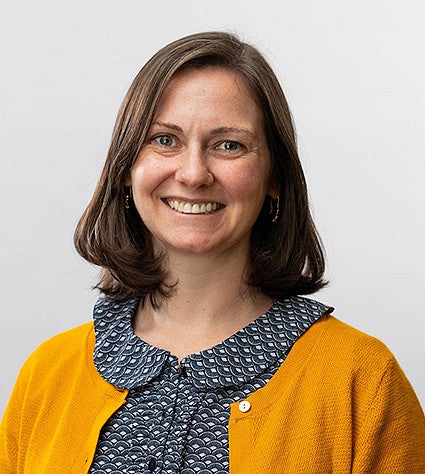
Learn more about Liz Budd, PhD, Evergreen Assistant Professor of Counseling Psychology & Human Services, through our Faculty Spotlight series.
Quick Facts
Hometown: Mostly Lake Oswego, OR growing up; I moved to Eugene after living in St. Louis, MO for a decade.
Primary research interest: Chronic disease prevention through the promotion of physical activity and healthy eating in community settings.
Favorite Book or Movie: Movies: A League of Their Own, The Sandlot, War, Forest Gump, Lion, Monsters, Inc., Up, Million Dollar Baby, and Stand By Me. I named my son after Benny the Jet Rodriguez from The Sandlot! Don’t tell my husband that though. Books: The Giver, Hunger Games, anything by David Sedaris or comedians; I also like poetry so work by Pablo Neruda, Adrienne Rich, and Kate Baer.
Hobbies: Walking fast, preferably in the woods with friends or family; swimming; vinyasa flow yoga; going to baseball games and plays; baking; organizing pantries and closets; talking with friends.
Say “Hello”!:
LinkedIn
Article: If you want to Support the Health and Wellness of Kids, Stop Focusing on Their Weight
UO Faculty Directory
Health Promotion Initiative
What brought you to the University of Oregon?
To start the job I have! I moved from St. Louis, MO to Eugene in 2016.
What is the focus of your current research?
I study health promotion and chronic disease prevention from a public health perspective. Chronic diseases like heart disease, cancer, and type 2 diabetes. Within this topic, I focus on communities experiencing disproportionate disease burden resulting from the inequitable distribution of social, economic, and environmental conditions that impact chronic disease.
One social condition that negatively impacts health is discrimination. Dr. Nichole Kelly and I developed an intervention to address and prevent weight bias, weight bias internalization, and weight-based discrimination in the workplace. Individuals with larger bodies, particularly women, experience frequent weight-related discrimination, which is then associated with many negative outcomes, including higher rates of chronic disease, depressive symptoms, disordered eating, and physical activity avoidance. Ultimately, we are working toward health equity by training healthcare providers, public health practitioners, and other health educators in more data-informed and inclusive methods for promoting health among people of all body sizes.
I also study what we call ‘small p policies’ like, local and institutional policies. These policies shape the environments in which we spend our time. These environments, in turn, can affect physical activity and eating behaviors, strong predictors of chronic disease risk. So, for example I’ve studied the quality of district school wellness policies, as well as implementation factors associated with changing school recess and lunchtime policies.
Lastly, since 2020, I have worked with a giant team of researchers, practitioners, and community-based organizations to address the disproportionately high rates of SARS-CoV-2 infection, and hospitalizations and deaths from COVID-19 among Latinx Oregonians. We collaboratively developed and implemented a culturally tailored and trauma informed intervention, Promotores de Salud, that aimed to promote engagement in our SARS-CoV-2 testing program and in other COVID-19 preventive behaviors among Latinx communities across 9 Oregon counties.
How do you hope your work makes an impact? Why do you think it’s important?
Despite increases in premature deaths due to COVID-19, chronic diseases such as heart disease, cancer, and type 2 diabetes continue to account for 7 of the top 10 causes of premature death in the United States and remain the predominant cause of disability. Marginalized population groups are typically most affected by chronic disease. My goal is to create relevant knowledge through my research that can aid in informed policy decision-making and the creation and dissemination of programs that prevent chronic disease and promote health equity across environments.
What message would you like to share with students considering coming to the College of Education?
I’d recommend looking into the wide variety of degree programs we offer. I never thought I’d be in the College of Education, given my public health background, but here I am and it’s a great place to be. I teach public health classes in Family and Human Services (undergrad) and Prevention Science (grad).
What do you love about living in Eugene?
I love the many great parks and trails. I can walk out my door and be in the woods in 10 minutes. That’s pretty awesome! I also like that I rarely have to make a reservation at a restaurant, I’m rarely in traffic, and I rarely have to drive very far. These seem like luxuries that afford me more time to do other things.
